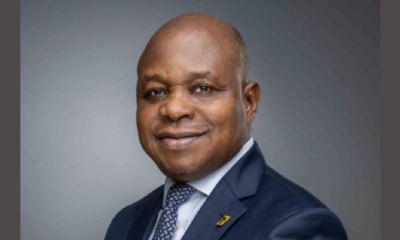As the world is evolving digitally, Nigerian banks are currently looking for ways to make the banking experience better and FirstBank is not an exception to this aggressive drive. The efforts in this regard include building and constantly improving on its product offerings like the FirstMobile, its industry-leading mobile banking app; FirstOnline, the internet banking portal and many other platforms provided by the Bank to ensure banking operations are performed with ease and convenience without having to be physically present at the bank.
In line with its commitment to offer these value-added products and services that suit the lifestyles of its customers, Nigeria’s most valuable bank brand, has one of the best bank Apps anywhere. FirstMobile is the official mobile banking application from FirstBank and it provides convenient access to both financial and non-financial transactions by FirstBank account holders via their mobile devices. It is sleek and convenient to use – evident in its easy enrolment process as all FirstBank customers with Verve and Naira MasterCards can begin using the App without having cause to visit a FirstBank branch. It is also poised to offer a more reliable and more convenient overall digital banking experience.
With FirstMobile, customers can enjoy real-time mobile banking services such as domestic funds transfer from self-owned accounts to other FirstBank accounts and other external bank accounts; QR payments, as well as make quick airtime purchases for self and others on all mobile networks (which can be done directly by selecting phone numbers from their phone contacts); bills payments; cheque services including confirm cheque and stop cheque, flight and cinema booking; and quick account services such as account balance inquiry, statement view, Virtual Card, Limit enhancement up to 10M & Airtime top-up limit up to 50,000. FirstMobile also offers Debit card enablement for usage abroad.
In addition, the lifestyle banking app offers FirstBank customers unique access to the latest articles and videos across a wide variety of categories, including technology and gadgets, life and travel, the economy, local news, luxury goods, business, health, sports, entertainment, shopping and more. The application is free and available for download to customers of FirstBank.
FirstMobile remains yet another obvious step towards leveraging evolving technologies to bring fast and convenient financial services closer to Nigerians, in line with the bank’s digital banking strategy.
With its efficiency, the Bank has delivered an app that has, over the years, consistently shown to support the consumer lifestyle by providing users with an instant suite of financial options on their mobile devices in a convenient and highly secure way.
As of June 2021, First Bank of Nigeria Limited, the most renowned Bank in Nigeria boasts 4,596,203 users on the FirstMobile App which is a 9% growth of the total users in the previous year and an average of 27,730,830 transactions every month. With such large patronage from its over 30 million customer base, the need to always create an easy way for customers to conduct financial transactions comes into play and impressively, a dedicated platform that allows FirstBank customers to conveniently make transactions with their mobile phones, Tablets and Pc is always within customers’ fingertips.
FirstMobile is also embedded with a card protection service for customers to enable and disable cards on channels, account switch off as well as second-factor authentication and device registration. Customers can remotely initiate the request for a new debit card as well as the replacement of a lost or damaged one, whilst managing activities on their card and account.
FirstMobile takes into cognizance the security of customers and their funds. The biometric for transactions is an innovative security upgrade on the application to validate transactions. This feature includes fingerprint for transactions, allowing the customer to use his or her fingerprint to consummate all transactions. Other features of the FirstMobile App include frequent transactions; dashboard flexibility and personalisation.
Customers can also take a photo or select from the Avatar (available icons) to personalize their dashboard and beneficiaries for Transfers, Bills payment & Airtime transactions by uploading a picture to associate with their beneficiary, especially the more frequent ones. The dashboard has been designed to reflect the lifestyle and social pattern of the user as it can be customized by adding any profile picture of choice. The dashboard also enables users to monitor their spending patterns over a period. It shows the inflow and outflow of funds on their account. With FirstMobile, you can book movie tickets ahead of time, thereby averting the risk of being told the movie is sold-out upon getting to the movie theatre.
In need of a loan to meet that pressing need, FirstMobile also has you covered and puts you at an advantage with the FirstAdvance, a product designed to offer convenient and easy access to cash for payroll customers awaiting payment of their salaries and also Nano Loan features. It is indeed an overall exciting App that ensures financial happiness.
To set up the FirstMobile App, customers with android phones should visit the Google Play store to download and install the FirstMobile app. Customers with Apple devices can download it from the Apple Store. Once installed, customers are required to open the app, tap the REGISTER button and use their FirstBank issued Naira MasterCard or Verve card to activate the app. After details have been inputted, an OTP code will be sent via an SMS to your phone number that is linked to your bank account and you are then required to Input a 5 digits code that will be your login password, Select two security questions and answer them, Create a personalised 4 digits transaction pin that will help your confirm transactions. Click Done and start enjoying the app.
FirstMobile is built to reflect FirstBank’s resolve at reinforcing the digitisation of payment systems, whilst putting customers at an edge to conveniently meet their everyday needs at any time, irrespective of where they are.


 Naira4 weeks ago
Naira4 weeks ago
 Naira4 weeks ago
Naira4 weeks ago
 Travel3 weeks ago
Travel3 weeks ago
 Jobs4 weeks ago
Jobs4 weeks ago
 Naira3 weeks ago
Naira3 weeks ago
 Naira3 weeks ago
Naira3 weeks ago
 Investment4 weeks ago
Investment4 weeks ago
 Travel4 weeks ago
Travel4 weeks ago



























